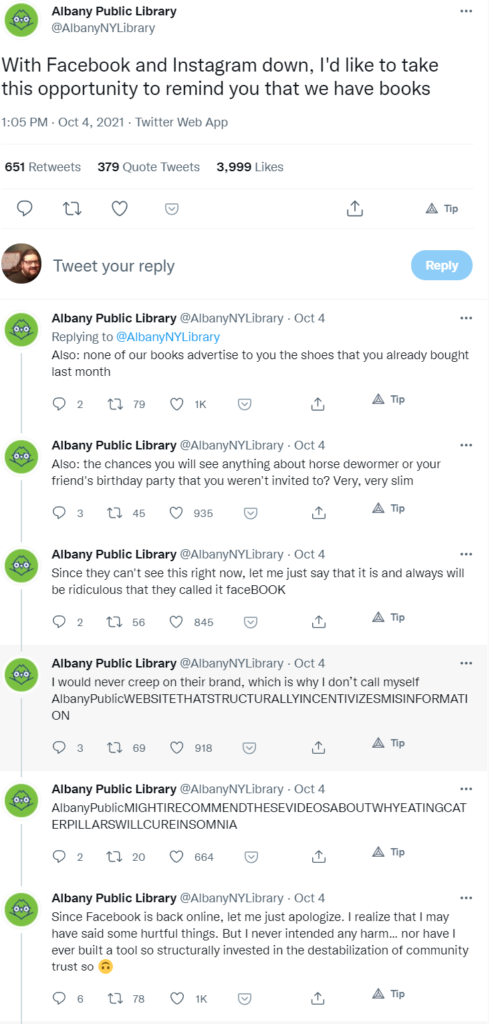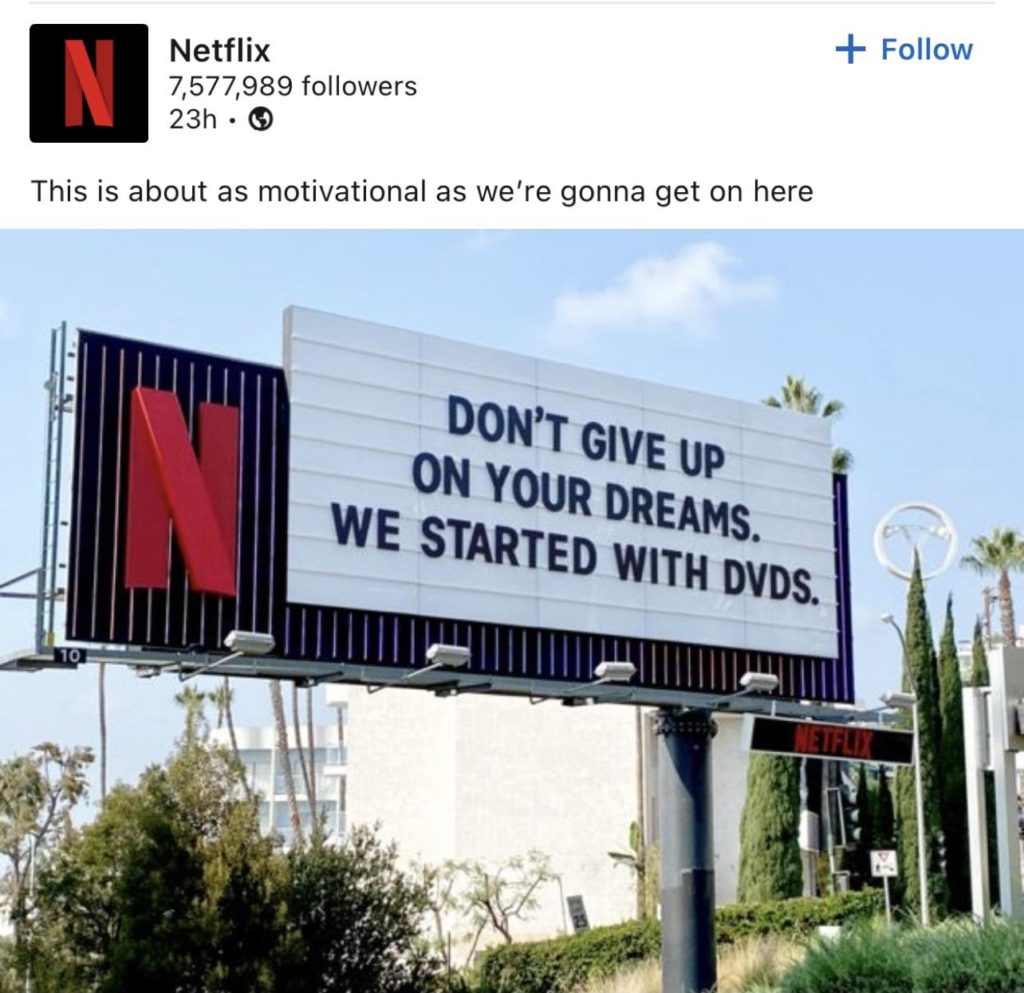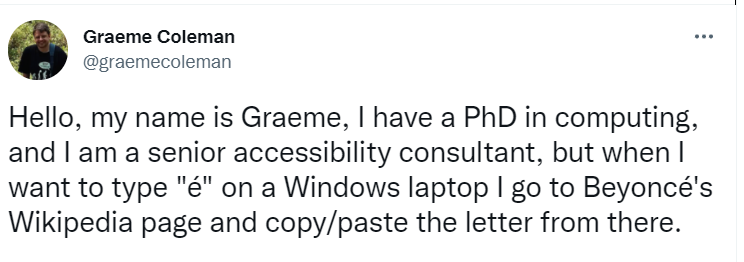1. Good Monday Morning
It’s Oct. 11th. Happy Indigenous Peoples Day. The proclamation that President Biden issued last Friday included this somber thought: “We must never forget the centuries-long campaign of violence, displacement, assimilation, and terror wrought upon Native communities and Tribal Nations throughout our country.” Biden is the first U.S. president to commemorate this holiday.
Today’s Spotlight is 1,293 words — about a 5 minute read.
2. News To Know Now
Quoted:”The original Bill of Rights is nearly 230 years old, and we’re still debating the meaning of nearly each of its 652 words. If an AI Bill of Rights is our ultimate goal, we’re still at the stage of haggling over the Articles of Confederation.” — Axios’ Bryan Walsh writing about the White House’s consideration of an “AI Bill of Rights.”
a) Fueled by the pandemic,the e-commerce explosion continues. TikTok owner Byte Dance is the latest entity to leverage its incredible presence into direct sales revenue. Big box Best Buy is launching a new $199 membership program that includes free shipping, installation, and priority purchases of undefined hard-to-find items. Amazon and Walmart are focusing their sights on prescription medications. Walmart + customers can now buy common generic prescriptions for heavily discounted prices without insurance while Amazon’s pharmacy services are offering 6 month prescription renewals.
b) YouTube has removed two official accounts owned by disgraced singer R. Kelly following his conviction on racketeering and sex trafficking charges. The company cited its creator responsibility guidelines for the move. Separately, YouTube announced that it will no longer allow climate change denialists to monetize their YouTube channels beginning next month.
c) A former Amazon warehouse employee in Colorado has sued the company because she says that mandatory COVID-19 screenings before work were not considered part of a work shift and employees were not paid for that time.
3. Search Engine News — No More Internet Explorer
If you are the single person out of every 200 North Americans who is still using Microsoft’s Internet Explorer browser, you’re going to have to find some site other than Google to search. Google software engineer Malte Ubl announced on Twitter that Google search will no longer work for IE sessions. “We did the Math [sic]. It is time,” he wrote.
Sept. 2021 browser market share by our friends at StatCounter:
Chrome 65%, Safari 18%, Edge 4%, Firefox 4%
Google also told an EU court that it is the top search term on Microsoft Bing in Europe. The thrust of the argument Alphabet makes while appealing an antitrust matter is that “People use Google because they choose to, not because they are forced to.”
Part of Google’s search experience includes advertising throughout the result pages. Google is now enhancing its ad disclosures to allow users to see all the ads a specific advertiser has run over the past 30 days.
From their announcement, “.. Imagine you’re seeing an ad for a coat you’re interested in, but you don’t recognize the brand. With advertiser pages, you can learn more about that advertiser before visiting their site or making a purchase.”
4. Spotlight Explainer — Silver Beacon
For our 400th issue, we’re taking the liberty of putting ourselves in the spotlight. We won’t have another big milestone issue until 2023, so don’t worry about this becoming a habit.
What does Silver Beacon Marketing do?
We do three distinct things: we promote an organization’s message, we increase the number of relevant people who see that message, and we track everything so we can quickly repeat what works in a continuous improvement cycle.
So it’s advertising?
We do a lot of advertising campaigns in a lot of places: Google, Bing, Twitter, Facebook, Instagram, LinkedIn, Amazon, and a lot more.
But we also do a lot of other marketing projects like search engine optimization that ensures that your site is found online, social media messaging, websites, emails, newsletters, and marketing strategy.
Are there any special industries that you work with?
We adore small organizations and work with more than our share of startups. We love teams that have a passion for what they do. You can see our client list here. We are exceptionally proud of never needing to hire a sales staff and only running advertising sporadically over the past fifteen years. Our business is entirely built on word-of-mouth. We’re thankful for all those referrals.
Why this newsletter?
You know how photocopying articles for colleagues turned into emailing each other links and that turned into, please for the love of everything holy, let me get some work done?
We wanted to give clients, colleagues, and friends the opportunity to have us drop by once a week for 5 minutes and let them know what they need to know in a nontechnical way. We write this for people who use technology, not for technologists.
Why do you ask us to forward this to friends and others?
Aw, you know the answer to that. But seriously, send this on to friends and colleagues who can use it. You’re likely a subscriber. You know that we don’t call or send other emails. Spotlight comes out every non-holiday Monday at 6 a.m. Eastern Time. That’s it. Click here and we will add you to the list.
Thanks again. Here’s to 400 more issues.
5. Did That Really Happen? — A New Conspiracy Theory Quiz
There are six seemingly simple questions in this Washington Post quiz that asks if you’ll fall into the conspiracy theory rabbit hole. I got all six correct. Can you do the same?
6. Following Up — EU Calls for Facial Recognition, Predictive Policing Bans
The European Parliament last Wednesday called for bans on law enforcement officers using facial recognition technology in public places and the elimination of predictive algorithms to profile “potential criminals.” We write often about police use of technology (most recently in our 2021 Spotlight in June).
It’s important to understand that it’s not the technology being questioned, but its use by police that may infringe upon your privacy.
7. Protip — Dark Mode in Google Search
Whether desktop or mobile, this explainer shows you how to enable dark mode on Google Search even if the rest of your display is set to regular view.
Screening Room — Very Stores
9. Science Fiction World — Caltech’s Secret Robot
We’ve shown you robots that scoot around and deliver food or drugs. We’ve even shown you some that can jump up or climb steps.
Caltech researchers have built LEONARDO (short for Legs Onboard Drone) that is way more mobile. LEONARDO can walk a slackline, hop, and even ride a skateboard. Check it out here, and understand that you are going to end up interacting with robots during your lifetime — even if only infrequently.
10. Coffee Break — The Monument Report
This very cool online report allows anyone to explore nearly 50,000 data records about monuments in America. It’s not comprehensive, but it’s a pretty darn big data set. There are essays and articles exploring all of it as well as guides to help teach students.
Most popular: Abraham Lincoln with 193 monuments
Most popular Native Americans: Tecumseh (21) and Sacagawea (20)
Non-Americans: Columbus (149), St. Francis of Assisi (73), Joan of Arc (26)
11. Sign of the Times





